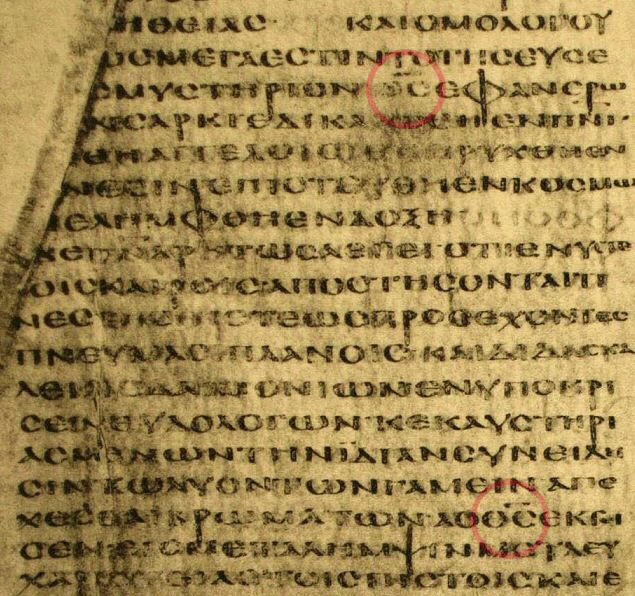coconut theology
coconuts for Jesus
Looking at Mss, and the vast evidence for this reading in 1 Timothy 3:16,
why would you (and others) follow the NIV and NWT's choice to remove the word "God" and replace it with a nonsensical "He"?
The NIV and NWT follow the same spirit:
https://www.biblegateway.com/passage/?search=1+Timothy+3:16&version=NIV
https://www.jw.org/en/library/bible/study-bible/books/1-timothy/3/
The words do not occur in the following corrupted texts:
Here is the vast extant literature which has the text in it:
Additionally:
"... GREGORY OF NYSSA, Against Eunomius (III 5:101, 155, 176, 232) ..." - Early Church Fathers And The Authorized Version, by Jack Moorman, page 57
Additionally:
1Ti_3:16 And without controversy great is the mystery of godliness: God was manifest in the flesh, justified in the Spirit, seen of angels, preached unto the Gentiles, believed on in the world, received up into glory.
why would you (and others) follow the NIV and NWT's choice to remove the word "God" and replace it with a nonsensical "He"?
The NIV and NWT follow the same spirit:
https://www.biblegateway.com/passage/?search=1+Timothy+3:16&version=NIV
https://www.jw.org/en/library/bible/study-bible/books/1-timothy/3/
The words do not occur in the following corrupted texts:
Aleph (Sinaiticus), (A*, Alexandrinus), (C*??), D*, G-gr, F-gr, pc, Old Latin: ar, c, d, dem, div, f, g, mon, x, z, Vulgate, Syriac: Pes.hitta, Harclean; Coptic: Sahidic, Bohairic; Gothic, Armenian, Ethiopic
Here is the vast extant literature which has the text in it:
"... Aleph-c, A-c, C-2, D-2, K, L, P
Psi
Cursives: MAJORITY, fam 13
Old Latin: Vulgate-ms
Also extant in 056, 061, 075, 0142, 0150, 0151, 0241. We have placed A and C on the revised side only because textual criticism insists in telling us that this is where they belong. In fact, that most careful of scholars, H. C. Hoskier believed the first hand palimpsest C read "God", and codex A, F.H.A. Scrivener wrote during the latter nineteenth century:
Cod. A, however, I have examined at least twenty times within as many years ... seeing (as every one must see for himself) with Berriman and the earlier collators that Cod A read THEOS ... the evidence of Young, of Huish, of Mill, of Berriman and his friends, when the page was comparatively unworn, cannot thus be disposed of (Plain Introduction, pp 639, 640 note). ...
... According to Scrivener, it is quoted by some of the very earliest fathers as Ignatius (110), and Hippolytus (235). Of the more than 250 cursive manuscripts containing I Timothy, Theos is found." - A Closer Look: Early Manuscripts & The A.V.; by Jack Moorman, pages 135
Psi
Cursives: MAJORITY, fam 13
Old Latin: Vulgate-ms
Also extant in 056, 061, 075, 0142, 0150, 0151, 0241. We have placed A and C on the revised side only because textual criticism insists in telling us that this is where they belong. In fact, that most careful of scholars, H. C. Hoskier believed the first hand palimpsest C read "God", and codex A, F.H.A. Scrivener wrote during the latter nineteenth century:
Cod. A, however, I have examined at least twenty times within as many years ... seeing (as every one must see for himself) with Berriman and the earlier collators that Cod A read THEOS ... the evidence of Young, of Huish, of Mill, of Berriman and his friends, when the page was comparatively unworn, cannot thus be disposed of (Plain Introduction, pp 639, 640 note). ...
... According to Scrivener, it is quoted by some of the very earliest fathers as Ignatius (110), and Hippolytus (235). Of the more than 250 cursive manuscripts containing I Timothy, Theos is found." - A Closer Look: Early Manuscripts & The A.V.; by Jack Moorman, pages 135
Additionally:
"... GREGORY OF NYSSA, Against Eunomius (III 5:101, 155, 176, 232) ..." - Early Church Fathers And The Authorized Version, by Jack Moorman, page 57
Additionally:
"... TEXT: "He was made apparent in the flesh"
EVIDENCE: S* A* C* G 33 syr(pal) syr(p,h)? cop?
TRANSLATIONS: ASV RSV NASV NIV NEB TEV
RANK: B
NOTES: "God was made apparent in the flesh"
EVIDENCE: Se A2 C2 Dc K L P Psi 81 104 614 630 1241 1739 1881 2495 Byz Lect
TRANSLATIONS: KJV ASVn RSVn NASVn NIVn
NOTES: "Which was made apparent in the flesh"
EVIDENCE: D* lat vg syr(p,h)? cop?
TRANSLATIONS: ASVn RSVn
COMMENTS: The word "who" was changed to "which" by some copyists to refer to "mystery." In an older manuscript that does not have accents and breathing marks, all that is required to change the Greek word for "who" (OS) to the abbreviation for "God" (OS) is to add two marks. This happened to several manuscripts, apparently to give a definite subject to the following verbs. ..." - Textual Variants: 1 & 2 Timothy, Philemon
EVIDENCE: S* A* C* G 33 syr(pal) syr(p,h)? cop?
TRANSLATIONS: ASV RSV NASV NIV NEB TEV
RANK: B
NOTES: "God was made apparent in the flesh"
EVIDENCE: Se A2 C2 Dc K L P Psi 81 104 614 630 1241 1739 1881 2495 Byz Lect
TRANSLATIONS: KJV ASVn RSVn NASVn NIVn
NOTES: "Which was made apparent in the flesh"
EVIDENCE: D* lat vg syr(p,h)? cop?
TRANSLATIONS: ASVn RSVn
COMMENTS: The word "who" was changed to "which" by some copyists to refer to "mystery." In an older manuscript that does not have accents and breathing marks, all that is required to change the Greek word for "who" (OS) to the abbreviation for "God" (OS) is to add two marks. This happened to several manuscripts, apparently to give a definite subject to the following verbs. ..." - Textual Variants: 1 & 2 Timothy, Philemon

